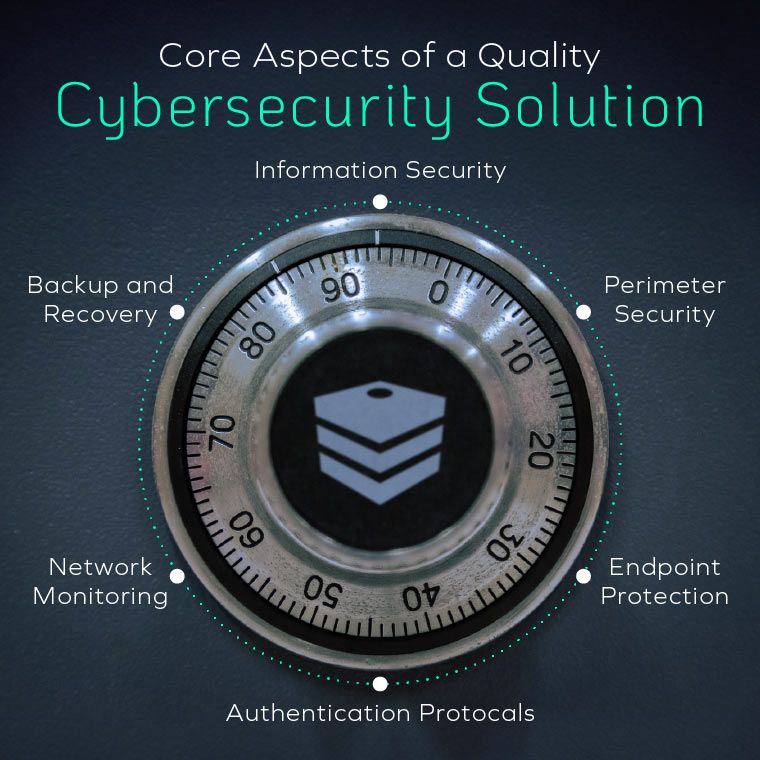Network Security Monitoring
How to Secure a Business Network
August 14, 2025
7 minute read

Modern businesses hold a vast amount of data and personal information that is considered highly valuable. For instance, Google and Facebook profit off our data every single year.
“For someone living in the United States, your data generated over $600 in revenue for just those two companies [Facebook and Google] last year, according to our analysis of their regulatory filings.” -Ben Wolford, Proton-
Sign up for our newsletter!
Threat actors and cybercriminals understand how valuable personal data and sensitive information can be, and aim to get their hands on as much as they can. With most threat actors being monetarily motivated, businesses need to invest in network security to deter and avoid as many attacks as possible, while also establishing protocols for cyber incidents that do occur.
With more users, devices, and software applications, there is a higher chance for network vulnerabilities and points of exploit, giving threat actors more opportunities. So, as your technology advances, so should your cybersecurity.
That’s why it’s important for businesses to understand what network security is, how it protects them, and the ways in which a layered cybersecurity strategy actively reduce organizational cyber risk levels.
If you’re looking for a network security provider, but aren’t sure where to start or who to trust, learn more about DOT Security services and operations on our Why DOT? page.
What Is Network Security for Businesses?
Business network security involves implementing measures and protocols to protect an organization's digital infrastructure from unauthorized access, data breaches, and cyberattacks. This includes the use of firewalls, intrusion detection systems, encryption, secure access controls, and regular security audits.
Additionally, it encompasses policies and employee training to promote awareness and adherence to best practices for maintaining a secure network environment.
How Does It Work?
Properly securing a business’ network involves a multi-faceted cybersecurity strategy that includes features like access management, endpoint protection, next-gen antivirus software, password management, workforce education, and much more.
Each of these aspects of the strategy work together to strengthen the others and result in effective business network security.
How AI Propels Network Security for Businesses
The sheer volume and complexity of network vulnerabilities have outpaced traditional security methods. AI has emerged as a transformative force, enabling businesses to shift from reactive defense to proactive, predictive protection.
At the heart of this shift is the use of systems that aggregate logs from across the network and apply AI to elevate critical events for human review. With billions of potential vulnerabilities across devices, AI helps prioritize threats that matter most—filtering noise and surfacing actionable insights.
Anomaly detection is another key application. AI systems continuously learn what “normal” looks like across traffic patterns, user behavior, and device activity. When deviations occur—whether it’s a login from an unusual location or a sudden spike in data transfer—AI flags them instantly, enabling rapid response.
AI also plays a vital role in detecting synthetic media and preventing fraud. As malicious actors use generative tools to mimic voices, faces, and executive communications, businesses must deploy AI trained to spot subtle inconsistencies. These tools not only detect threats but evolve with each encounter, learning to identify new attack vectors.
Beyond detection, AI enhances incident response. It can summarize security events, recommend mitigation steps, and even automate containment protocols. This reduces response time and ensures consistency in how threats are handled.
However, AI’s power must be matched with transparency and explainability. Systems that make security decisions must be auditable and understandable. Building AI with traceability ensures teams can trust its guidance and act decisively.
Ultimately, AI is just one piece of the modern network security puzzle that still very much needs human oversight and guidance.
4 Steps to Secure a Business Network
Here are a few steps a business can take to secure their network.
1. Educate Employees on Cybersecurity Threats, Best Practices, and Protocols
Organization-wide education in cybersecurity best practices is a crucial step toward securing a business’ network because 95% of threats can be traced to user error.
Clicking on dangerous links, opening attachments, and downloading unverified software are all examples of how users can unwittingly invite malicious actors into a business network and cause a data breach.
Businesses should be conscious of their employees’ ability to prevent breaches and their susceptibility to social engineering techniques.
Ensure your workforce is properly educated on:
- Potential threats
- Your organization's cybersecurity protocols
- How to create strong passwords
- Updating software frequently
2. Have a Backup Plan
Unforeseen circumstances can throw a wrench in the best-laid plans.
It’s important every business has a plan for these situations in the form of data backup and recovery to ensure nothing important is lost and that operations can be back up and running instantly. If a business experiences a service outage or is hacked, a backup and recovery plan reduces downtime, saves money, and preserves crucial data.
3. Regularly Update Software
Software developers are constantly updating their products—such as antivirus, firewalls, operating systems, and apps—with new security measures that tackle old vulnerabilities and reduce errors in the code.
If your software isn’t kept up-to-date, you’re putting your network at risk of an entirely preventable bad situation.
Old versions of software have been scoured by bad actors who find and seek out vulnerabilities. If you keep these outdated versions active on your devices, hackers know exactly where to look to find a way in.
4. Stay Up to Date on the Latest Threats
Cybercriminals are constantly changing the ways they attempt to steal information or penetrate a network.
Make sure your entire organization is updated on these threats so that everyone knows what to look out for and how to avoid falling victim to these scams.
Consistent cybersecurity education is highly recommended in this case as an educated workforce can be a massive aid in the overall security of a business.
Security professionals should also be confident in their knowledge of what threats they’re facing and their ability to contain new and emerging attack vectors into their network.

Types of Business Network Security Solutions
In order to execute the steps we talked about above, a business needs access to top-of-the-line security features and solutions, like:
Endpoint Security
Endpoint security focuses on protecting end-user devices such as desktops, laptops, smartphones, and tablets that connect to a corporate network. These endpoints are prime targets for cybercriminals seeking to launch attacks or gain unauthorized access to an organization’s network.
Key components of endpoint security include endpoint detection and response (EDR) solutions, which provide continuous monitoring and analysis of endpoint activities, encryption, which plays a critical role in protecting data on the network, and antivirus applications that prevent malware from launching on devices.
By integrating technology, policies, and user education, endpoint security provides a robust defense against threats targeting end-user devices.
Identity & Access Management
Identity and access management (IAM) in network security refers to the policies, processes, and technologies used to manage digital identities and control access to an organization's resources. IAM ensures that only authorized individuals have the appropriate access to critical systems and data, thereby reducing the risk of unauthorized access and potential security breaches.
Key components of IAM include authentication, which verifies the identity of a user, and authorization, which determines the level of access granted to that user. Common methods for authentication include passwords, biometrics, and multi-factor authentication (MFA), which adds an extra layer of security by requiring additional verification steps.
IAM also involves the implementation of role-based access controls, where permissions are assigned based on the user's role within the organization. This ensures that employees have access only to the information and systems necessary for their job functions, minimizing the risk of insider threats and data leakage.
Network Security Monitoring
Network security monitoring involves the continuous observation and analysis of a network to detect and respond to security threats and vulnerabilities in real time. This process uses various tools such as intrusion detection systems (IDS), intrusion prevention systems (IPS), and security information and event management (SIEM) systems, to monitor network traffic, logs, and activities.
By analyzing patterns and anomalies, these systems can identify potential security incidents, such as unauthorized access attempts, malware infections, and data exfiltration.
An effective network security monitoring strategy includes the deployment of sensors and agents across the network to collect data, which is then centralized and analyzed. Security analysts investigate alerts generated by monitoring tools to determine their validity and severity.
This proactive approach enables organizations to quickly identify and mitigate threats, reducing the risk of data breaches and minimizing potential damage.
Backup & Disaster Recovery
Backup and disaster recovery (BDR) ensures business continuity and data protection in the event of data loss or system failure. Backup involves regularly copying data from primary storage to a secondary location, which can be onsite, offsite, or in the cloud.
This process ensures that data can be restored in case of accidental deletion, hardware failure, or cyberattacks such as ransomware. Effective backup strategies typically include full, incremental, and differential backups, scheduled to run at regular intervals to minimize data loss.
Disaster recovery (DR) focuses on restoring IT infrastructure and operations after a significant disruption, such as natural disasters, cyberattacks, or system failures. A disaster recovery plan outlines the procedures and technologies required to recover data, applications, and services within a specified timeframe, known as the recovery time objective (RTO).
By combining robust backup practices with a well-defined disaster recovery plan, organizations can minimize downtime, reduce the impact of disruptions, and maintain business operations in the face of unexpected events.
Why Businesses Choose to Partner With MSSPs for Business Network Security
Properly securing a business network involves a lot of moving parts with consistent hardware and software updates and ever-evolving threats, technology, and strategies. To stay secure, there’s no time to rest on your laurels.
Keeping up with it all can be a daunting task for small or over-burdened IT or cybersecurity teams who may lack the knowledge to tackle such a variety of tasks.
Whether you have an in-house team or no security team at all, partnering with a managed security service provider (MSSP) allows businesses that can’t build and maintain a complete internal department with a fully-fledged team of cybersecurity experts at their disposal.
MSSPs have specialists in every facet of cybersecurity who can assess a business’ needs, build a tailored strategy, and implement that strategy with long-term management to ensure everything works, is updated, and is ready to fight future threats.
Final Thoughts on Business Network Security
Securing a business network means building a fully-fledged cybersecurity strategy that covers all the bases from device management to software upgrades to access control.
The number of layers involved can be overwhelming to small or inexperienced internal teams, but partnering with an MSSP can alleviate these issues because they provide all the expertise, tools, strategies, and management that you need to stay secure.
If you want to start building a powerful and comprehensive cybersecurity strategy to protect your network, but aren’t exactly sure where to begin, check out our Why DOT? page for more information on what a partnership with an MSSP looks like.
